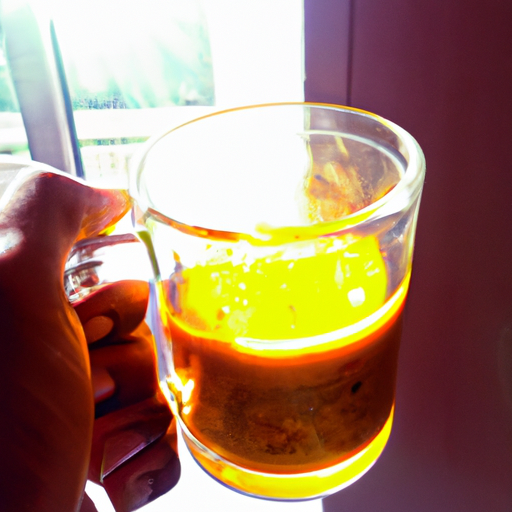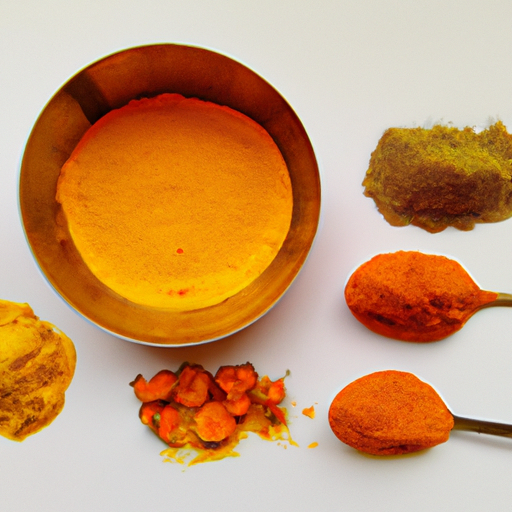Are you not feeling well and considering if turmeric tea can provide some relief?
Turmeric has long been used in traditional medicine for its anti-inflammatory and antioxidant properties. And now, turmeric tea is gaining popularity as a natural remedy for various health conditions, including when you’re sick.
Turmeric tea is made by steeping ground or grated turmeric root in hot water. It has a warm, earthy flavor and can be enjoyed hot or cold.
But does it actually help with sickness? In this article, we will explore the benefits of turmeric tea when you’re feeling under the weather, as well as precautions you should take when consuming it.
So, sit back, grab a cup of turmeric tea, and let’s dive in!
Key Takeaways
- Turmeric tea can be beneficial when sick due to its anti-inflammatory and antioxidant properties
- The active compound in turmeric, curcumin, can help fight off infections and ease symptoms of illness such as a sore throat or stuffy nose
- Combining turmeric with ginger in a tea can be the most effective in reducing symptoms of illness
- Natural remedies such as turmeric tea can complement conventional medicine, but it is important to consult with a healthcare professional before trying any new treatment.
What is Turmeric Tea?
You’re probably wondering what turmeric tea actually is – well, it’s a warm and comforting beverage made from steeping turmeric root in hot water. Turmeric is a brightly colored spice commonly used in Indian and Middle Eastern cuisine. The root of the turmeric plant is where the flavor and color come from, and it is also where most of the health benefits lie.
Health benefits of turmeric tea include its ability to reduce inflammation, boost the immune system, and aid in digestion. Additionally, turmeric has been studied for its potential to reduce the risk of heart disease, Alzheimer’s disease, and even certain types of cancer.
In terms of culinary uses, turmeric is often used to add flavor and color to dishes such as curry and rice. But, turmeric tea is a unique way to enjoy the benefits of this spice in a warm and comforting beverage.
Turmeric’s active compound, curcumin, is what gives it its many health benefits. Curcumin has been studied for its antioxidant and anti-inflammatory properties, which can help to reduce the risk of chronic disease.
So, if you’re looking for a warm and comforting beverage that also has potential health benefits, turmeric tea might just be the perfect choice.
Turmeric’s Active Compound: Curcumin
Curcumin, the compound found in turmeric, has been extensively studied for its many health benefits. One of its most notable properties is its ability to reduce inflammation in the body. Inflammation is the body’s natural response to injury or infection, but when it becomes chronic, it can lead to many health problems, including autoimmune diseases, heart disease, and cancer.
Curcumin has been shown to be a potent anti-inflammatory agent, and it may help alleviate symptoms of illness by reducing inflammation in the body. Turmeric supplements are a popular way to increase your intake of curcumin, but drinking turmeric tea is another option.
Turmeric tea is made by steeping fresh or dried turmeric in hot water. It has a slightly bitter taste and a warm, spicy aroma. In the next section, we will explore how turmeric tea can help when you are sick.
How Turmeric Tea Can Help When Sick
When battling an illness, a warm cup of turmeric tea can feel like a soothing hug for the body, providing a burst of comfort and relief. But did you know that turmeric tea can also help boost your immunity and reduce inflammation? Here are four ways that turmeric tea can help when you’re feeling under the weather:
-
Turmeric contains a powerful compound called curcumin, which has been shown to have immune-boosting properties. Drinking turmeric tea can help support your body’s natural defenses and fight off infections.
-
Inflammation is a natural response to illness or injury, but too much inflammation can actually hinder the healing process. Turmeric has anti-inflammatory properties that can help reduce inflammation in the body, easing symptoms like a sore throat or stuffy nose.
-
Turmeric tea is a natural pain reliever. If you’re dealing with a headache or body aches from being sick, drinking turmeric tea can help ease your discomfort without the need for over-the-counter pain medication.
-
Turmeric tea can help soothe your digestive system. When you’re sick, your stomach may be feeling off. Turmeric has been shown to have a calming effect on the digestive system, making it a helpful addition to your recovery routine.
With all of these potential benefits, it’s no wonder that turmeric tea is a popular home remedy for when you’re feeling sick. But what does the evidence say? Let’s take a closer look at the research behind turmeric tea’s benefits.
The Evidence Behind Turmeric Tea’s Benefits
When it comes to the benefits of turmeric tea, there is compelling evidence from both scientific studies and traditional medicine. As you explore this subtopic, you’ll learn about the research behind turmeric’s anti-inflammatory and antioxidant properties. You’ll also discover its potential to support brain function and digestive health.
In addition, turmeric has been used in traditional medicine for centuries. Modern science is shedding new light on its therapeutic potential.
Scientific Studies
Research has shown that drinking turmeric tea may have positive effects on the immune system, making it a good choice when feeling under the weather. Scientific studies have investigated the benefits of turmeric supplements, which contain curcumin, the active ingredient in turmeric. These studies have found that curcumin can improve the immune response by increasing the production of antibodies and immune cells, leading to a stronger defense against pathogens.
A comparative analysis of turmeric tea versus other natural remedies has also been conducted. One study compared the effectiveness of turmeric tea, ginger tea, and a combination of both in treating symptoms of the common cold. The study found that the combination of ginger and turmeric tea was the most effective in reducing symptoms such as cough, congestion, and sore throat.
Additionally, turmeric tea has been found to have anti-inflammatory and antioxidant properties, which can help alleviate symptoms of inflammation and oxidative stress commonly associated with illness. With these scientific findings, turmeric tea can be a valuable addition to traditional medicine in treating sickness and promoting overall health.
Traditional Medicine
You can count on traditional medicine to provide a holistic approach to healing and health. Herbal remedies have been used for centuries to cure ailments and maintain good health. Turmeric, for example, has been used in Ayurvedic medicine for thousands of years due to its anti-inflammatory and antioxidant properties. It is also a staple in traditional Chinese medicine and has cultural significance in Hinduism.
To understand the cultural significance of turmeric, let’s take a look at a table that shows its uses in different countries:
| Country | Use |
|---|---|
| India | Used in religious ceremonies and as a spice in cooking |
| China | Used to treat inflammation, pain, and digestive issues |
| Indonesia | Used to treat skin diseases and as a cosmetic ingredient |
| Middle East | Used to treat respiratory illnesses, skin diseases, and as a dye for textiles |
As you can see, turmeric has played an important role in various cultures for centuries. Its medicinal properties have been recognized and utilized by traditional healers across the globe. Now that you understand the cultural significance of turmeric, let’s move on to how to make turmeric tea.
How to Make Turmeric Tea
First, grab a small saucepan and combine grated turmeric, ginger, and black pepper with water over medium heat to make turmeric tea. You can also add other ingredients like honey or lemon for taste.
There are various turmeric tea variations, including golden milk (which adds coconut milk and cinnamon) and turmeric chai (which adds traditional Indian spices such as cardamom and cloves).
Turmeric tea has numerous benefits for overall health. It contains curcumin, a powerful antioxidant and anti-inflammatory compound that can help reduce inflammation, boost immunity, and improve brain function. Studies have also shown that turmeric tea may help lower the risk of chronic diseases such as heart disease, cancer, and Alzheimer’s.
However, it’s important to note that turmeric tea should be consumed in moderation, as excessive intake can have adverse effects. To transition to the next section about precautions when consuming turmeric tea, it’s important to be aware of these potential risks.
Precautions When Consuming Turmeric Tea
It’s important to be mindful of potential risks when enjoying the numerous health benefits of turmeric tea. While turmeric is generally considered safe for consumption, there are a few precautions you should take to avoid any potential health risks.
Firstly, turmeric has blood-thinning properties. This means that if you’re taking blood-thinning medication or have a bleeding disorder, you should consult your doctor before consuming large amounts of turmeric. Additionally, turmeric may interact with certain medications, such as those used to treat diabetes or acid reflux, so it’s important to speak with your healthcare provider before adding turmeric tea to your regular diet. To help you better understand the potential risks and benefits of turmeric tea, here’s a table that lists some of the key precautions you should take when consuming it:
| Precautions | Health Risks |
|---|---|
| Consult your doctor if you have a bleeding disorder or are taking blood-thinning medication | Increased risk of bleeding |
| Speak with your healthcare provider before consuming turmeric tea if you’re on medication for diabetes or acid reflux | Possible interactions with medication |
| Do not consume excessive amounts of turmeric tea | Upset stomach, dizziness, or diarrhea |
| Do not consume turmeric tea if you’re pregnant or breastfeeding | Risk of miscarriage or harm to the baby |
| Always buy high-quality turmeric from a reputable source | Risk of contamination or adulteration |
Now that you know the precautions you should take when consuming turmeric tea, let’s explore some other natural remedies for when you’re sick.
Other Natural Remedies for When You’re Sick
Looking for alternative ways to feel better when you’re under the weather? There are plenty of natural remedies out there to help you get back on your feet.
Herbal remedies, such as ginger, echinacea, and elderberry, have all been shown to have anti-inflammatory properties and can help relieve symptoms like coughing, sore throat, and congestion. Ginger tea, for example, can help clear up sinuses and reduce nausea, while echinacea and elderberry can boost your immune system and shorten the duration of your illness.
Homeopathic treatments like honey, garlic, and apple cider vinegar are also great options to consider. Honey has antibacterial properties and can help soothe a sore throat, while garlic can help fight off infection and boost your immune system. Apple cider vinegar, when mixed with warm water and honey, can help alleviate symptoms of a cold or flu, such as coughing and congestion.
While natural remedies can be effective, it’s important to consult with a healthcare professional before trying any new treatment, especially if you have a pre-existing medical condition or are taking medication. Remember, natural remedies can be a great way to complement conventional medicine, but they should never replace it entirely.
If your symptoms persist or worsen, it’s important to seek medical attention. In the next section, we’ll discuss when it’s appropriate to see a doctor.
When to See a Doctor
If your symptoms persist or worsen, it’s important to seek medical attention to determine the best course of action. While natural remedies can be helpful in certain situations, they may not always be enough to address serious health concerns.
Here are some warning signs that indicate it’s time to see a doctor:
-
High fever: If your temperature reaches 103°F or higher, it’s a sign of a serious infection that requires medical attention.
-
Difficulty breathing: If you’re having trouble breathing, it could be a sign of a respiratory infection or a more serious condition like pneumonia.
-
Persistent vomiting or diarrhea: If you can’t keep fluids down for more than a day or experience severe diarrhea that lasts for several days, you may become dehydrated. Dehydration can lead to serious health complications if left untreated.
It’s important to listen to your body and seek medical attention if you experience any of these warning signs. Don’t wait until your symptoms become more severe, as this could delay the treatment you need to get better.
Frequently Asked Questions
What are some common illnesses that turmeric tea can help with?
"Turmeric tea is a natural remedy for inflammation and digestive issues. It’s important to note that pregnant women and children should consult with a doctor before consuming. Consistency is key for maximum benefits, and potential side effects should always be considered." ‘Additionally, it’s recommended to consume turmeric tea in moderation and not exceed the recommended dosage.’
Can turmeric tea be consumed by pregnant women or children?
Turmeric tea benefits are numerous, but when it comes to pregnant women and children, safety is key. Exploring the risks and benefits is crucial. Turmeric tea vs. supplements: which is better for health? Consult a healthcare professional.
Can turmeric tea be taken with other medications?
Did you know that turmeric can interact with some medications, including blood thinners and diabetes drugs? It’s important to talk to your doctor before taking turmeric tea. Dosage recommendations vary depending on individual circumstances.
How often should turmeric tea be consumed for maximum benefits?
For maximum benefits, consume turmeric tea daily. It has anti-inflammatory properties that can improve digestion, reduce joint pain, and boost the immune system. Different ways to prepare include adding ginger or honey.
Are there any potential side effects of consuming turmeric tea?
Possible output: "Possible side effects of consuming turmeric tea include digestive issues and allergic reactions. It is important to be aware of these potential risks before incorporating turmeric tea into your diet."
Conclusion
Congratulations! You’ve learned about the amazing benefits of turmeric tea when you’re feeling under the weather.
But beyond just being a natural remedy for colds and flu, turmeric tea is also a symbol of hope, strength, and resilience. Like the vibrant yellow color of the turmeric spice, this tea can brighten up your mood and give you the energy to fight off any illness.
It’s a reminder that even in the darkest times, there’s always a ray of light that can guide you to a healthier, happier life. So the next time you’re feeling sick, brew yourself a cup of turmeric tea and let its healing powers uplift your mind, body, and spirit.
Remember, you’ve got this!










